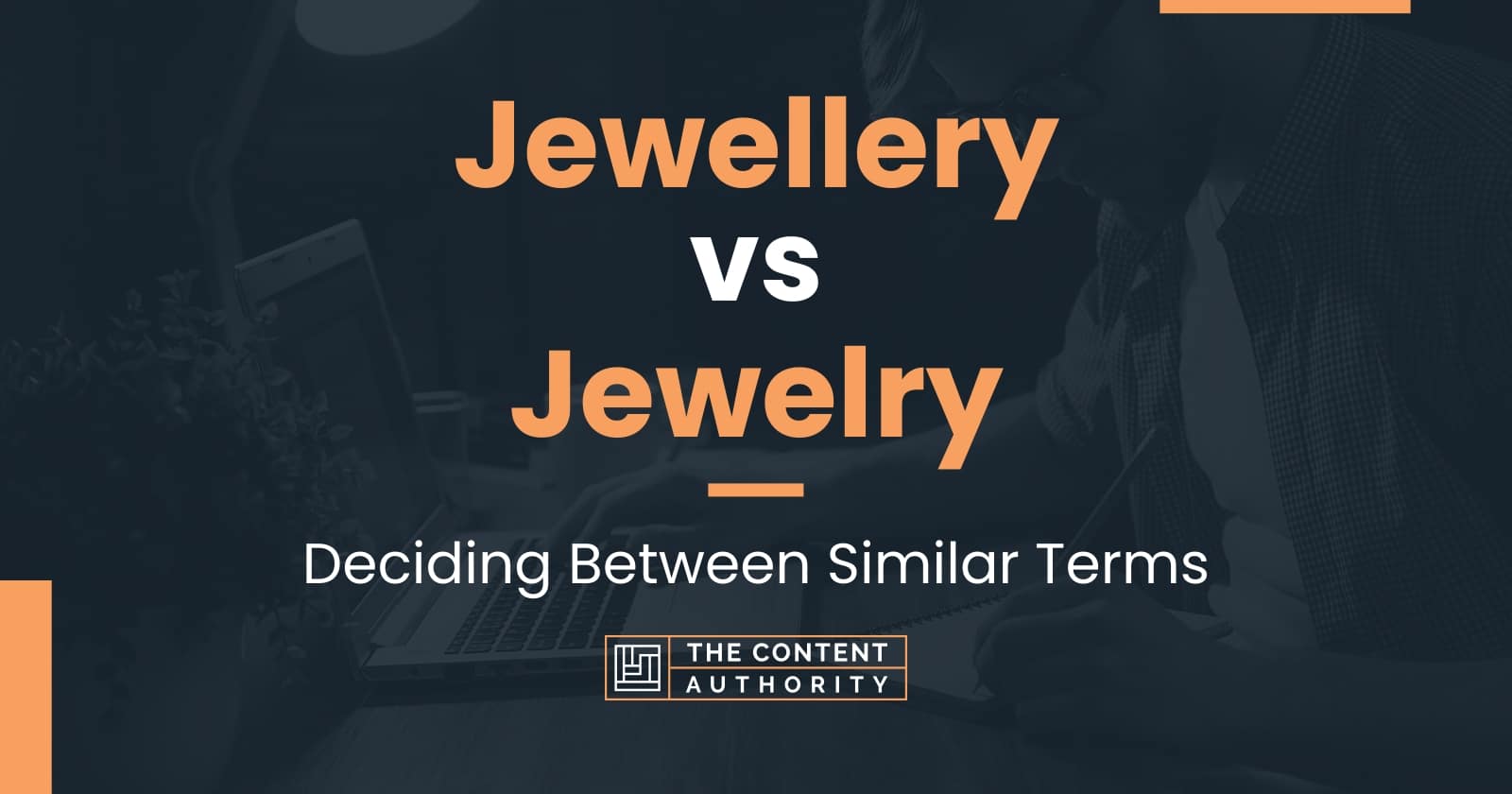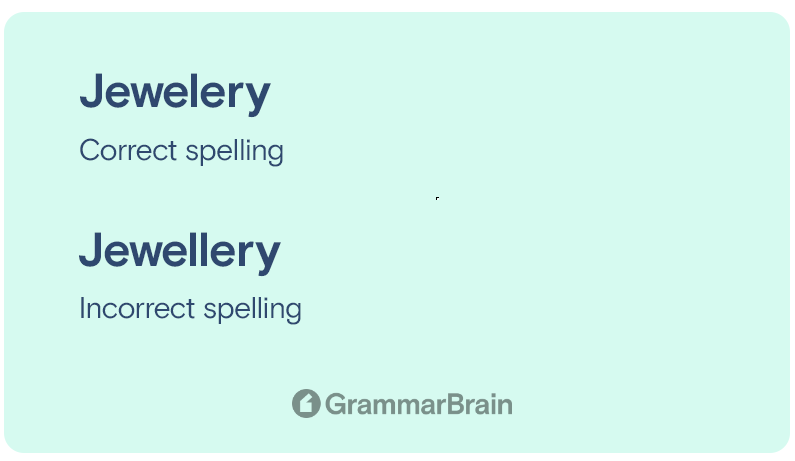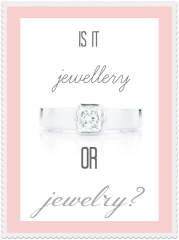jewelry vs jewellery pronunciation
Related Articles: jewelry vs jewellery pronunciation
Introduction
In this auspicious occasion, we are delighted to delve into the intriguing topic related to jewelry vs jewellery pronunciation. Let’s weave interesting information and offer fresh perspectives to the readers.
Table of Content
Navigating the Gemstone Labyrinth: A Guide to the "Jewelry" vs. "Jewellery" Pronunciation Debate

The English language, a tapestry woven with threads of diverse origins, often presents curious inconsistencies. One such anomaly is the spelling and pronunciation of the word denoting adornments crafted from precious metals and gems. "Jewelry" and "jewellery," two seemingly interchangeable forms, ignite a debate that transcends mere lexical curiosity. This exploration delves into the historical and cultural nuances that shape this linguistic divergence, offering a comprehensive understanding of the preferred usage in various contexts.
A Tale of Two Spellings: Tracing the Etymological Roots
The origins of the word "jewelry" can be traced back to the Old French "joiel," meaning "jewel." Over time, this evolved into the Middle English "jewelrie," eventually settling into the modern "jewelry." This spelling, prevalent in American English, reflects a direct adaptation from the French root, emphasizing the word’s association with individual jewels.
"Jewellery," on the other hand, emerged from the Middle English "jewelrie" through a slightly different linguistic path. It retains the "y" ending, a characteristic of British English, which often maintains older spelling conventions. This spelling underscores the collective nature of the word, referring to a collection of jewels or ornaments rather than individual pieces.
The Great Divide: American English vs. British English
The "jewelry" vs. "jewellery" debate is, in essence, a manifestation of the broader linguistic divergence between American and British English. While "jewelry" reigns supreme in American English, "jewellery" holds sway in British English, along with many other English-speaking nations like Australia, Canada, and India.
This divergence is not merely a matter of preference; it reflects the distinct historical and cultural trajectories of these language varieties. American English, born from the fusion of various dialects, often embraced a more streamlined approach to spelling, reflecting a desire for simplicity and practicality. British English, with its deeper roots in the older forms of the language, has retained more archaic spellings and pronunciations.
Beyond the Spelling: Understanding the Pronunciation
The pronunciation of "jewelry" and "jewellery" further underscores the linguistic differences between American and British English. In American English, "jewelry" is pronounced with the "y" sounding like the "i" in "bit," while in British English, "jewellery" is pronounced with the "y" sounding like the "i" in "bite."
These variations in pronunciation are not merely stylistic choices but reflect the distinct phonological systems of these two language varieties. American English tends towards a more open and relaxed pronunciation, while British English often retains a more formal and precise articulation.
Navigating the Linguistic Landscape: A Guide to Usage
The choice between "jewelry" and "jewellery" is often dictated by the context of communication. In formal writing and speech, especially in academic or professional settings, it is advisable to adhere to the spelling and pronunciation conventions of the target audience.
For instance, when addressing an American audience, "jewelry" is the preferred spelling and pronunciation. Conversely, when communicating with a British audience, "jewellery" is the appropriate choice. In informal settings, such as casual conversation or social media, both spellings are generally acceptable, though it’s prudent to be mindful of the audience’s linguistic background.
The Importance of Clarity and Consistency
The choice between "jewelry" and "jewellery" is not merely a matter of linguistic pedantry but a matter of clarity and consistency. Using the correct spelling and pronunciation ensures that your message is understood and interpreted accurately by your intended audience.
In a professional context, using the wrong spelling or pronunciation can convey a lack of attention to detail and potentially undermine your credibility. In a personal context, using the correct spelling and pronunciation can demonstrate respect for the linguistic preferences of others and foster a sense of shared understanding.
FAQs: Addressing Common Queries
Q: Is "jewelry" or "jewellery" correct?
A: Both spellings are correct, but "jewelry" is preferred in American English, while "jewellery" is preferred in British English.
Q: How should I pronounce "jewelry" or "jewellery"?
A: "Jewelry" is pronounced with the "y" sounding like the "i" in "bit" in American English. "Jewellery" is pronounced with the "y" sounding like the "i" in "bite" in British English.
Q: Does the spelling or pronunciation affect the meaning of the word?
A: No, the spelling and pronunciation do not affect the meaning of the word. Both "jewelry" and "jewellery" refer to adornments crafted from precious metals and gems.
Q: What is the best way to determine which spelling and pronunciation to use?
A: Consider your audience and the context of your communication. If you are writing for an American audience, use "jewelry." If you are writing for a British audience, use "jewellery."
Tips for Navigating the "Jewelry" vs. "Jewellery" Debate
- Know your audience: Consider the linguistic background of your audience and tailor your spelling and pronunciation accordingly.
- Use a style guide: Refer to a style guide, such as the Chicago Manual of Style or the Associated Press Stylebook, for guidance on spelling and pronunciation.
- Be consistent: Choose one spelling and pronunciation and use it consistently throughout your writing or speech.
- Ask for clarification: If you are unsure about the appropriate spelling or pronunciation, do not hesitate to ask for clarification.
Conclusion: Embracing the Linguistic Diversity
The "jewelry" vs. "jewellery" debate underscores the rich tapestry of the English language. While seemingly a minor linguistic quirk, it reflects the dynamic interplay of history, culture, and linguistic evolution. By understanding the nuances of this debate, we gain a deeper appreciation for the diversity of English and the importance of adapting our language to different contexts. Ultimately, the key to effective communication lies in choosing the spelling and pronunciation that best serves our audience and ensures clarity and understanding.








Closure
Thus, we hope this article has provided valuable insights into jewelry vs jewellery pronunciation. We appreciate your attention to our article. See you in our next article!
